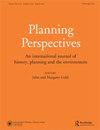走廊作为空洞的象征:莫桑比克的殖民历史和现在在其发展走廊的纠缠
IF 0.9
3区 历史学
0 ARCHITECTURE
引用次数: 1
摘要
本文章由计算机程序翻译,如有差异,请以英文原文为准。
Corridors as empty signifiers: the entanglement of Mozambique’s colonial past and present in its development corridors
ABSTRACT This article examines the infrastructural histories and legacies of three transnational corridors centred on the Mozambican cities of Maputo, Beira and Nacala. Underpinned by physical infrastructures, corridors were central to the extractive European colonial enterprise in Africa. Corridors facilitated the flows of resources, goods and knowledge between metropoles, African urban centres, and their hinterlands. Nowadays, corridors insert African cities and regions into global circuits of capital that perpetuate past extractive practices and policies. They are also powerful imaginary spaces for advancing political projects and developing specific configurations of government. Accordingly, the idea of a corridor may remain useful over time even as claims for their economic necessity ebb and flow. In this article, we examine the continuities between three contemporary Mozambican corridors and older colonial transitways that connected the three cities to British colonial interests in southern Africa. Then, drawing on Laclau and Mouffe’s discourse analysis, we suggest that corridors can serve as ‘empty signifiers,’ becoming linked to diverse understandings, standing for fluid yet enduring ambitions of connectivity, competitiveness, and regional integration. After scrutizing recent investments in the corridors, we reflect on their role in constructing a ‘new’ Mozambican economic order that is nevertheless deeply entangled in the country’s past.
求助全文
通过发布文献求助,成功后即可免费获取论文全文。
去求助
来源期刊

Planning Perspectives
Multiple-
CiteScore
1.50
自引率
12.50%
发文量
85
期刊介绍:
Planning Perspectives is a peer-reviewed international journal of history, planning and the environment, publishing historical and prospective articles on many aspects of plan making and implementation. Subjects covered link the interest of those working in economic, social and political history, historical geography and historical sociology with those in the applied fields of public health, housing construction, architecture and town planning. The Journal has a substantial book review section, covering UK, North American and European literature.
 求助内容:
求助内容: 应助结果提醒方式:
应助结果提醒方式:


